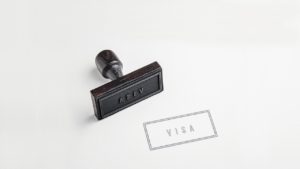#LifeInCzechia Do you have a TV or/and a radio in your home? Are you in Czechia on either long-term residence permit or a permanent residence permit? Then you’re most likely obligated to pay what we call “concessionary fees”. These fees are used to finance public television and radio institutions in Czechia and have to be paid monthly by every household and business that owns a TV or a radio. Read this article to learn more.
Search Results for: residence permit
Road to Permanent Residency: Pass Your Czech Exam Early
#LifeInCzechia If you’ve been living in the Czech Republic for around 4 years, it is time to start considering getting your permanent residence permit. This type of card is available to you after 5 years of continuous stay in Czechia and will bring you many advantages. And the good news is, you can start on the preparations early. For instance, you can pass your Czech exam early to avoid stress when the time to apply comes.
All You Need to Know About the Mandatory Adaptation and Integration Course
#LifeInCzechia Are you a third-country citizen who’s new to the Czech Republic? Have you been granted a long-term residence permit or a permanent residence permit? There’s a high probability that you have to attend the Adaptation and Integration Course “Welcome to the Czech Republic”. The Ministry of the Interior has established this obligation for specific groups of third-country citizens who got their residence permits after 1 January 2021. Here are the details.
How Long Can I Stay Outside Czechia? The Ins and Outs of Permanent Residency
#LifeInCzechia Do you own a permanent residence permit? Have you ever thought about staying outside Czechia for a period of time? People tend to ask us how long they can stay outside the country – and here are the answers! Watch out, the periods are different for living in the EU and in a third country. We’ll also answer the question of whether having a Czech permanent residence permit can help you obtain the same document elsewhere in the EU.
Higher Minimum Salary for New Blue Card Holders in Czechia From 1 May
#ImmiUpdatesCzechia Are you planning on moving to Czechia to pursue a highly-qualified job? Maybe you’re coming here on a residence permit known as the blue card. From 1 May 2023, new blue card holders are required to have a monthly gross salary of a minimum of 60 530 CZK. This is because the average annual salary in Czechia has gone up. And watch out, this new salary is also valid for some applications submitted through programmes of economic migration before 1 May.
ICT Card: How Does it Work and How to Switch to an Employee Card
Are you a third-country citizen who has been transferred to Czechia from abroad within one big corporation? Then you’re most likely here on an intra-company employee transfer card. This long-term residence permit allows you to stay and work in this country under specific conditions. What are these conditions? And what if you decide to switch to a different type of residence permit or change your employer?
Czech Language Exams for Expats Will Be More Difficult
After six years of consideration, the Czech Ministry of Education has decided to make Czech language exams more difficult for expats interested in getting a permanent residence permit. This means that instead of passing a level A1 language exam expats will have to prove their knowledge of the Czech language at level A2.
Mandatory Integration Courses for Expats Have Started
The Czech Ministry of the Interior’s proposal for mandatory integration courses for expats living in the Czech Republic was finally approved after a few months-long silence. The courses started taking place on January 1 as originally planned and are mandatory for some non-EU expats who have received or will receive a residence permit in the Czech Republic after January 1, 2021.
Coronavirus: More Czech Embassies Have Resumed Normal Operation
Submitting a new application for a visa or residence permit or their extension might be still problematic even though the restrictions on traveling in regards to coronavirus are being gradually lifted. Some embassies have, however, resumed normal operation. Citizens of the “safe” countries can also arrive in the Czech Republic with no restrictions which means that they don’t have to prove the purpose of their stay.
Coronavirus in Czechia: Changes in Arrivals of non-EU Citizens
Are you a student from a non-EU country and not sure if you will be allowed to enter the country for next semester starting in September 2020? Can you leave the Czech Republic for the summer holidays and come back? And what about those who are already back in their homeland? Once the COVID-19 pandemic spread into the Czech Republic, everything came to a halt and borders were closed so no one could get in or out without a good reason. And even then travelling was essentially impossible for a couple of weeks. Now there are updates regarding the arrivals of foreigners from non-EU countries and extensions of long-term residence permits.










